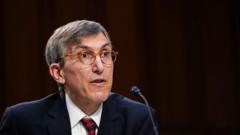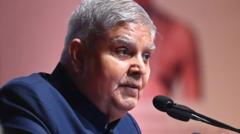Peter Marks steps down, citing incompatibility with new Health Secretary's vision.
Top FDA Vaccine Official Resigns Amid Controversy Over HHS Reforms

Top FDA Vaccine Official Resigns Amid Controversy Over HHS Reforms
A pivotal resignation at the FDA raises alarms about public health amidst ongoing vaccine skepticism.
A high-ranking official at the U.S. Food and Drug Administration (FDA), Peter Marks, has reportedly resigned under pressure, igniting concerns over the future of public health standards in the country. Marks submitted his resignation to the Department of Health and Human Services (HHS) on Friday after being presented with an ultimatum: resign or face termination. His resignation letter, which has been widely circulated in the media, indicates his discontent with the current administration's approach to truth and transparency under HHS leader Robert F. Kennedy Jr.
Marks, who played a significant role in the development of COVID-19 vaccines during the previous Trump administration, expressed dismay over the HHS's direction, implying that the Secretary favors confirming his own misinformation rather than adhering to scientific integrity. The HHS responded by stating that if Marks was unwilling to align himself with restoring scientific credibility, his position was untenable.
Effective April 5, 2023, Marks departs with a "heavy heart," emphasizing his concerns about the resurging measles outbreak in Texas as indicative of the dangers stemming from undermining established public health science. Currently, the U.S. has reported two fatalities and over 523 measles cases, with the majority concentrated in Texas. Marks has been a fixture at the FDA since 2012, notably serving as the director of the Center for Biologics Evaluation and Research since 2016.
Secretary Kennedy, a controversial figure with strong anti-vaccine beliefs, recently initiated a sweeping restructuring of HHS that could result in the loss of 10,000 jobs across his agency, encompassing positions at the FDA and the CDC. These developments raise critical questions about the future direction of public health policy in the U.S., particularly as the nation grapples with rising vaccine skepticism and public health challenges.




















